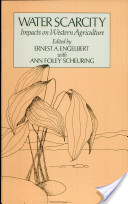Given the findings of the recent federal-state Colorado River Basin Water Supply and Demand Study, it’s useful to look back at what other efforts at sussing out the region’s water problems and solutions have found. It’s especially interesting given the (to me) striking assertion in the Basin Study that building a pipeline from the Missouri, or towing icebergs down from Alaska, is not the answer.
In September 1982, Harvey Banks*, one of the fathers of the great plumbing system that moves water around California, was among a group of water experts who gathered in Monterey to take stock of the water problems in the western United States. Banks was lead author of the chapter in the resulting conference proceedings** on “Developing New Water Supplies”. The study looked, among other things, at the possibility of importing water from the Missouri River. Banks’ conclusion:
[T]he probabilities for large-scale new water supplies or developments for the region in the foreseeable future are not great. The potentials for significant breakthroughs in local water supply enhancement or any large-scale water importation for the semiarid West are limited.
That was 30 years ago. Though, to be fair, Banks and his colleagues didn’t give the iceberg thing a serious look.
** Water Scarcity: Impacts on Western Agriculture, edited by Ernest A. Engelbert, University of California Press, 1984


Since the answer involves changing our lifestyles and being more thoughtful, the chances for continued population growth in the West are not great.
Best,
D
Dano – I don’t think that’s necessarily true. Mike Cohen’s work for the Pacific Institute:
http://www.pacinst.org/reports/co_river_municipal_deliveries/
shows impressive reductions in water usage in a number of communities that have been grappling with the most severe water vulnerabilities.
Pingback: Another Week of GW News, December 30, 2012 – A Few Things Ill Considered